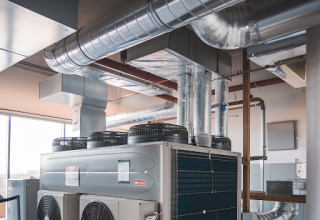An air barrier is a system of materials that essentially encases the shell of a building to ensure it is protected from the effects of airflow and leakage. Controlling airflow is one of the most important things to consider when designing and constructing buildings. In order to be safe, durable, comfortable, and economical, all buildings require an airflow that carries moisture effectively. Let’s discover 3 key reasons why buildings need air barriers.
Air Barriers Prevent Moisture
Moisture is one of the biggest threats to the stability and safety of a building. Air typically includes moisture in the form of water vapor, and when the air cools, it is less able to hold this moisture. In turn, the saturation of water vapor density falls, and relative humidity rises. If the air continues to cool, condensation begins. Over time, condensation can cause problems such as mold, mildew, staining, slip hazards, damage to equipment, corrosion and decay of building fabric, as well as poor performance of insulation. Subsequently, introducing an air barrier can prevent moisture from diffusing through the building fabric to a point where temperatures can be low enough to reach a dew point.
Essentially, water vapor is able to follow wherever air moves and so proper air sealing can reduce the risk of water vapor moving into the wall system where prolonged exposure can lead to moisture issues like rotting and mold. Air leakage can transport significantly more moisture into and through the building enclosure than through regular vapor diffusion, and so installing air barriers can prevent expensive structural or health problems further down the line.
Better Control of Interior Temperatures
Does your building have an air conditioning system fitted? During the hot summer season, people typically cool and dehumidify the air to a lower temperature and humidity than the exterior environment. In the winter, however, people heat and humidify the air to a higher temperature and humidity than the exterior. The process of controlling interior temperatures and humidity is all about maximizing comfort and can be greatly enhanced through the use of air barriers.
Large quantities of controlled air can be lost to uncontrolled air leakage, and this can impede the performance of building systems like HVAC as well as any insulation solutions. Consequently, proper air sealing through the use of air barriers can prevent any unwanted temperature fluctuations and, in some cases, improve the efficiency of HVAC equipment. Above all, this ensures building occupants enjoy better indoor air quality and a more comfortable environment.
Reduced Utility Bills
Rising energy costs are a concern for most building owners. Finding ways to reduce utility bills is therefore of primary concern for the majority of people. Protecting buildings from the effects of airflow and air leakage offers a potential solution to these worries. Consequently, installing an air barrier system can improve the maintenance of conditioned air, meaning less energy is needed to recondition the air.
Buildings that make use of air barriers typically do not have to compensate for leaks. Additionally, proper air sealing can even allow buildings to use smaller, more efficient HVAC equipment. As a result, quite often, the reduction in air conditioning system size and cost can offset the cost of installing air barriers as well as lowering energy bills.
Ultimately, air barrier systems are an essential component of a building enclosure and ensure that air pressure relationships within the building stay under control. This allows occupants to enjoy good air quality and a safe environment. All in all, installing high-performance air barriers that can stand the test of time has benefits that cannot be ignored.
Looking for more ways to improve insulation in your building? You might want to consider installing UPVC cladding. Check out this blog post to learn about the benefits of UPVC cladding.










